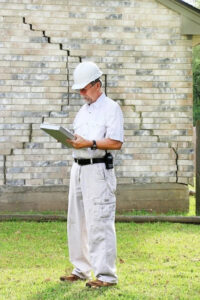Identifying Common Signs of Foundation Problems 
As a homeowner in Texas, it’s essential to know the warning signs that may indicate a problem with your home’s foundation. Several red flags could signal potential foundation issues, from sloping floors to cracks in the walls. We discuss some of the most common signs of foundation problems in houses and provide tips on identifying them. Homeowners can take timely action and avoid costly repairs by knowing what to look out for.
What Causes Foundation Problems?
Various factors can cause foundation problems in homes, but some of the most common include poor soil conditions, water damage, and structural changes. Let’s take a closer look at each of these causes.
- Poor Soil Conditions: The type of soil your home is built on plays a crucial role in the stability of its foundation. If the soil cannot support the house’s weight, it can lead to settling or sinking, causing cracks and other structural issues. Additionally, soil that expands and contracts due to changes in moisture levels can also put pressure on the foundation.
- Water Damage: Water damage is another major cause of foundation problems. When water seeps into the soil around a home’s foundation, it can cause the soil to shift and expand, putting pressure on the foundation. This can lead to cracks and other damage over time if not addressed.
- Structural Changes: Any changes made to a home’s structure, such as adding or removing walls, can also impact its foundation. These changes can cause uneven weight distribution and put strain on the foundation, leading to issues like sagging floors and cracked walls.
- Poor Drainage: Inadequate drainage around a building can lead to excess moisture accumulation near the foundation, weakening the soil support and causing foundation problems.
- Extreme Weather Conditions: Severe weather conditions like prolonged drought can dry out the soil, causing it to shrink away from the foundation. Conversely, excessive rain can lead to soil expansion and increased pressure on the foundation.
- Tree Roots: Large trees growing near a building can cause foundation issues as roots grow underneath the foundation, potentially causing uplift or absorbing significant amounts of water, leading to soil shrinkage.
- Poor Construction and Material Quality: Foundations built with substandard materials or improper construction techniques can develop problems, such as cracking or settling over time.
- Age of the Structure: Older buildings may experience foundation problems due to wear and tear over time, including the degradation of materials and the natural settling of the building.
- Landscaping and Grading Issues: Improper land grading around a building can lead to water pooling near the foundation. Inadequate landscaping can also contribute to poor drainage, exacerbating the risk of foundation problems.
- Environmental Changes: Changes in the surrounding environment, such as new construction or removal of nearby trees, can alter the water table or soil conditions, impacting the foundation.
- Heavy Vibrations: Regular heavy vibrations from nearby traffic, construction, or industrial activities can weaken the foundation over time.
- Subsidence: Subsidence occurs when the ground beneath the foundation sinks, either due to natural geological movements or activities like mining.
ng.
Identifying and addressing the underlying causes of foundation problems is crucial in maintaining the structural integrity of a building. Regular inspections and proactive measures can help prevent or mitigate these issues, ensuring the longevity and safety of the structure.
Knowing these common causes can help homeowners be more vigilant and take preventative measures to protect their home’s foundation. Regular inspections and addressing any issues early on can save a lot of time, money, and stress in the long run. In the next section, we will discuss some key warning signs that indicate potential foundation problems.
Common Signs of Foundation Problems
At Du-West Foundation Repair, we frequently encounter signs indicating a homeowner faces foundation problems. Recognizing these signs can be crucial in addressing the issues before they escalate into significant structural damages. As experts in foundation repair, we want to share with you some common indicators that suggest your foundation may need attention. Awareness of these signs is critical to maintaining your home’s structural integrity and safety.
Common Signs of Foundation Problems:
- Cracks in Walls or Floors: Noticeable cracks in the interior or exterior walls, especially those wide, long, or growing, can indicate foundation shifting or settling.
- Uneven or Sloping Floors: If you observe that your floors are uneven or feel like they’re sloping, this can be a sign of foundation issues.
- Doors and Windows That Stick or Won’t Close Properly: If doors or windows are suddenly difficult to open or close, it might be due to the foundation shifting and warping the frames.
- Gaps Around Window Frames or Exterior Doors: Visible gaps around doors and windows on the exterior of your home can signal foundation movement.
- Cracks in Foundation Walls: Visible cracks in your foundation walls, particularly horizontal cracks, are a clear sign of foundation problems.
- Water Damage or Moisture in the Basement: Water seepage or moisture in your basement can indicate cracks or weaknesses in your foundation.
- Bowing or Leaning Walls: Walls that appear to be turning inwards or leaning could be under strain from a shifting foundation.
- Cabinets or Counters Pulling Away from the Wall: If cabinets or countertops start to detach from the walls, it could be due to the movement of the foundation.
- Sagging Roof or Roof Leaks: Foundation problems can manifest in issues with your home’s roofing, including sagging or leaks.
- Noticeable Odors or Mold: Persistent musty odors or mold growth in basements or crawl spaces can be linked to foundation issues causing moisture problems.
- Visible Changes in Exterior Landscape: Changes around your home, like soil pulling away from the foundation, can indicate underlying problems.
- Chimney Cracks or Leaning: A chimney cracking or leaning away from the house strongly indicates foundation movement.
Addressing foundation problems is crucial to prevent further damage to your home. If you notice any of these signs, we at Du-West Foundation Repair are here to offer expert evaluation and solutions. Our team provides effective and long-lasting repairs to ensure the safety and stability of your home.
How to Identify Foundation Problems
When it comes to identifying foundation problems, there are a few key areas that homeowners should focus on.
- Exterior Inspection: Start by walking around the exterior of your home and looking for any visible signs of foundation issues. This can include cracks in the bricks or concrete, bowing walls, or gaps between windows and doors.
- Interior Inspection: Next, inspect the interior of your home for any signs of foundation problems. Look for cracks in walls and ceilings, uneven floors, or doors and windows that don’t close properly.
- Water Damage: Keep an eye out for any water damage in your home, as this can be a main cause of foundation problems. Check for leaks in the roof or plumbing, and make sure your gutters are properly draining water away from the foundation.
- Foundation Level: Use a level to check the foundation of your home for any slopes or dips. This can indicate that there is an issue with the foundation’s stability.
- Mold or Mildew Growth: Excess moisture in the home can lead to mold and mildew growth, which can also be a sign of foundation problems. Keep an eye out for any musty odors or visible growth in areas such as basements and crawl spaces.
If you notice any of these warning signs, it’s important to consult a professional for further inspection and advice. They will be able to assess the severity of the issue and recommend proper solutions for repair.
The Cost of Ignoring Foundation Problems
Ignoring foundation problems can have serious consequences that go beyond just the cost of repairs. The longer these issues are left unaddressed, the more severe and expensive they become.
Let’s take a closer look at some of the potential costs of ignoring foundation problems:
- Structural Damage: Foundation problems can cause significant damage to the structure of your home, such as cracks in walls, uneven floors, and even foundational shifting. This not only affects the appearance of your home but also its stability and safety.
- Decreased Property Value: A damaged foundation can greatly decrease the value of your home, making it difficult to sell in the future. Many potential buyers will be hesitant to purchase a house with known foundation issues.
- Safety Risks: If left unchecked, foundation problems can lead to serious safety risks for you and your family. Uneven floors and walls can cause trips and falls, while structural damage can put the entire house at risk of collapse.
- Mold and Mildew: Foundation issues often involve water damage, which can lead to mold and mildew growth in your home. This not only poses health risks but also requires costly clean-up and remediation.
- Pest Infestations: Cracks in the foundation can provide easy access for pests such as termites, ants, and rodents. These unwanted guests can cause further damage to your home and require costly pest control measures.
In addition to these direct costs, ignoring foundation problems can also lead to a lot of stress and inconvenience for homeowners. Dealing with repairs and potential safety risks can be overwhelming and disrupt your daily life. It’s important to address any warning signs of foundation issues as soon as possible to avoid these consequences.
So, if you notice any red flags in your home’s foundation, don’t hesitate to seek professional help and get it inspected. Taking timely action can save you from the high costs and headaches of ignoring foundation problems. Remember, your home is a valuable investment and it’s important to protect its structural integrity for the long term. So, stay alert and proactive in maintaining your home’s foundation!
